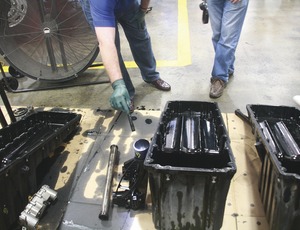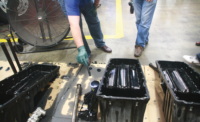
With new federal greenhouse-gas emissions and fuel-economy standards for on-road trucks set to take effect in 2016, engine-oil manufacturers are working on the first new oil standard in a decade. With newer diesel engines running hotter in pursuit of better efficiency, the oils they need will have to face a fresh battery of tests.
"The key drivers for this new category are the changes in regulations for the 2017 model year," says Dan Arcy, global OEM technical manager with Shell Global Solutions. "That's lower greenhouse-gas emissions, lower CO emissions and fuel-economy improvements."
Getting to the new standard, called Proposed Category 11, or PC-11, requires collaboration between engine-oil makers, truck and engine manufacturers as well as the chemical firms that make engine additives.
Dan Arcy chairs the new-category development team, which also has representatives from oil makers Chevron and Safety Kleen and engine manufacturers Caterpillar, John Deere, Cummins, Navistar and Paccar. "We are currently devising the test matrix, deciding which tests on which engines should be included," says Arcy.
Many of the new tests focus on oil oxidation stability and aeration at high temperatures. "The reason for this is that some engines are going up as much as 10°C—that's a pretty substantial increase in temperature," he says.
In order to accommodate engines that are operating at higher temperatures, the PC-11 category will have two classifications. PC-11A covers higher-viscosity oils and will have full backwards compatibility with older engine models. It is also expected to bring an estimated 1.6% improvement in overall fuel economy. The PC-11B category is something new, encompassing lower-viscosity oils designed to perform in a high-temperature, high-shear environment. Fuel-economy gains have not been finalized but may exceed PC-11A's.
The main difference is PC-11B oils will not be fully compatible with older engines, and Arcy notes that none of the engine manufacturers have committed to support backwards compatibility with PC-11B. "Our concerns are that the lower-viscosity stuff [PC-11B] might be able to protect some engines from recent years, and fleet owners don't want to have to carry multiple tanks for different oils," he says.
Even with the final standard still years away, companies already are seeking the sweet spot for these low-viscosity oils. "We've been blending down some of the oils that meet the old CJ-4 standard to low viscosity and putting them into field trials to see how they perform," says Matt Urbanak, chief formulator for Shell Rotella in North America. "We're trying to provide products at these low viscosity levels without compromising durability."
"Our customers have become accustomed to getting extremely long lives out of their engines," says Shell's Arcy. "They are not going to want to give up engine life or durability to get better fuel economy."
Delays in devising the test lineup may push back the introduction date of the new standard, Arcy adds. "We're still being asked to have the product available and licensable in April of 2016, but, looking at the schedule now, it could get pushed out to September 2016."



Post a comment to this article
Report Abusive Comment